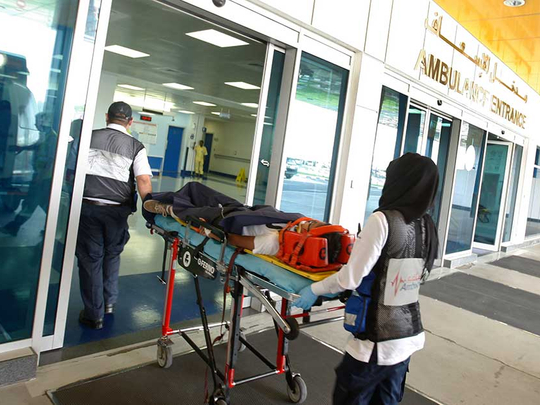
The Dubai Health Authority (DHA) plans to substitute the National ID card for the insurance card for all residents by end of 2016, a senior official said.
Dr Haidar Al Yousuf, Director of health funding at DHA, told Gulf News the transition will happen throughout 2016. “As of now only National Identity cards for Emiratis under Sa’ada and Enaya can be electronically read for insurance cover. This year all residents will have this facility extended to them. We are asking insurance companies to comply.”
So far nearly 90 per cent Emiratis have been covered under Sa’ada and Enaya insurance schemes and the DHA is in the process of initiating preventive screening for all age groups. “All Emiratis will [be covered by] the preventive health screening programme, which is age appropriate, and we will be sending out notifications soon so that those who haven’t registered for the insurance cover are motivated to complete this process. We want a 100 per cent cover for all citizens residing in Dubai.”
Dr Al Yousuf gave a projection of different health care projects that are underway for 2016, which includes the completion of mandatory health insurance cover for all by June 30, 2016. “Companies in Phase One and Two have already complied since implementation started in 2014. Many others in Phase 3, too, have begun complying. So June 30 is actually the end date as we have announced this well in advance so that organisations had different timelines to readjust their health care arrangements and a sufficient window was given for compliance with the law. By the end of June, by law, every resident in the emirate of Dubai will have to have this mandatory health cover and the minimum basic package, which has a cover of up to Dh150,000, [with] premiums ranging between Dh615 and 700.”
So far nearly 70 per cent of expatriates in Dubai have been brought under the mandatory insurance cover and, as the Phase 3 gets completed, Dr Al Yousuf hopes the DHA will also be able to achieve 100 per cent success here.
In 2016 plans are afoot to tighten the entitlement law, and companies found to be lagging behind will face punitive action such as fines as visa renewal will be linked to the mandatory health insurance cover.
Dr Al Yosuf said that by the first quarter of 2016, incentives such as free gym memberships, complimentary dinners and coffee etc will be rolled out.
“This means that when residents make a healthy choice, like going sugar free or opting for low fat options in restaurants etc, they will get points on their insurance card, which can be redeemed for these offers. We are working with service providers and retail outlets to make this possible.”
The DHA is also on track for creating the a contingency public fund to help underprivileged residents who may incur an unaffordable medical expenditure that is not covered in their health insurance. These could include premature births, cancer treatment and road accident trauma cases among other things.
“We plan to introduce this in 2016 but this will be announced along with DHA’s new health care strategy,” said Dr Al Yousuf.












